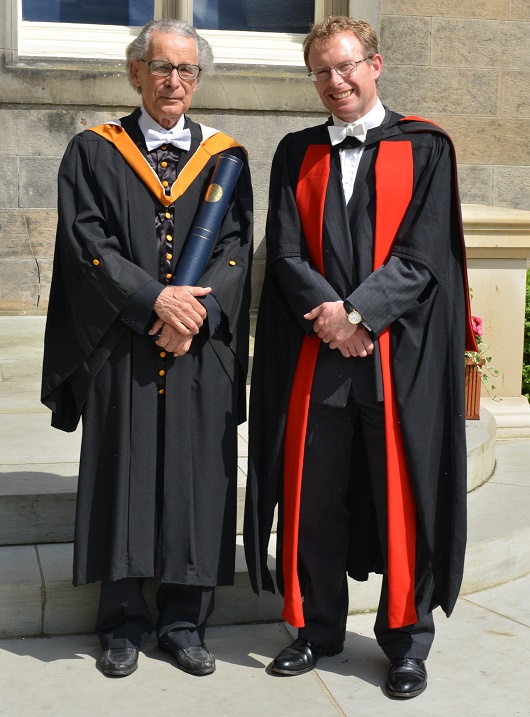Laureation Address: Professor Sir Geoffrey Lloyd

Laureation by Professor Jason König, School of Classics, for Professor Sir Geoffrey Lloyd, recipient of the Honorary Degree of Doctor of Letters
Chancellor it is my privilege to present for the degree of Doctor of Letters, honoris causa, Professor Sir Geoffrey Lloyd.
Geoffrey Lloyd is one of the twentieth and twenty-first centuries’ most important scholars of ancient culture and ancient philosophy. He has revolutionised the study of ancient Greek and Roman science and pioneered new comparative approaches to the study of ancient Greek and Chinese thought.
He studied as an undergraduate at King’s College, Cambridge, and was then a fellow at King’s from 1957 to 1989. His first book Polarity and Analogy was published in 1966. In 1987, following an invitation to lecture in Beijing, he launched into the study of ancient Chinese language and Chinese science. More recently he has begun to work also on Indian and Mesopotamian culture. He has been widely honoured. He became a Fellow of the British Academy in 1983. In 1984 he was Sather Professor at the University of California, Berkeley; his lectures there were published in his 1987 book, The Revolutions of Wisdom. He was knighted in 1997 for ‘services to the history of thought’. From 1989 to 2000 he was Master of Darwin College, Cambridge. He chaired the Needham Research Institute Trust in Cambridge from 1992 to 2002. He is currently based at the Needham Institute as Professor Emeritus of Ancient Philosophy and Science.
Side-by-side with those leadership positions, he has sustained an astonishingly prolific publication record, with twenty-seven books, translated into twelve different languages, and a vast number of articles and chapters.
I cannot possibly hope to give an overview of those publications in the few minutes I have here. Instead I want to try and give some impression of what it is like to read Geoffrey Lloyd’s work. When future historians of science look back on his work, just as he has looked back on our classical sources, they will find an extraordinarily rich body of material.
Perhaps the most important theme of all in his work is a determination to understand ancient science and ancient worldviews on their own terms. That determination has been informed by many decades of dialogue with scholarship from anthropology, sociology and cognitive science. And it has been accompanied by close attention to the links between ancient science and its wider cultural and social context. Striking also is his insistence on the complexity of the cultures and the problems he is dealing with. That insistence informs his comparative work too: he gives attention to the differences between cultures as much as their similarities, and to the internal variations which make generalisation and over-simplification so hazardous.
The rigour and intelligence of his writing is compelling: once you start reading it is hard to stop. He has a remarkable capacity to focus in on telling details from our ancient sources while also at the same time sketching out the contours of a much bigger picture, in a way which makes you see ancient intellectual culture with new eyes. His 1996 book Adversaries and Authorities is a wonderful example: in just over 200 pages it offers us a broad vision of the role of competition and persuasion in both Greek and Chinese science over many centuries. It is also packed with detailed readings, with original analysis of dozens of works by Plato and Aristotle, Galen and the Hippocratic texts on medicine, writers like Anaximander, Eudoxus and Ptolemy on cosmology and astronomy, Euclid, Archimedes, Pappus and Proclus on mathematics, and many more, along with their numerous Chinese counterparts.
I would challenge anyone to read his work without a sense of admiration, but his writing is never intimidating; it is always engaging and accessible, above all I think because he is so honest about the problems and limitations of the evidence he is dealing with. His books are like building blocks in a bigger vision, each one following on from the next, testing out what we can say about ancient science and ancient culture more broadly, refining those ideas and building on them in successive publications. His scrupulous methodological clarity has inspired the work of countless others, as has his personal generosity and his support for younger scholars.
Let me say finally that he has also written inspiringly about the ways in which studying ancient culture can raise fresh questions for the problems we face in the modern world, in particular questions about what the modern university should be. His work on ancient intellectual disciplines, for example in his 2004 book Ancient Worlds, Modern Reflections, or his 2009 book Disciplines in the Making, reminds us powerfully that the divisions between different fields of study, which we often take for granted, are not inevitable. He has acted on that belief in his own scholarship, through his determination to look beyond narrow disciplinary boundaries. He is not simply a philosopher, or a classicist, or an anthropologist or a historian of science, but a scholar who shows us what there is to gain from dialogue which stretches right across those many different fields.
Chancellor, in recognition of his extraordinary achievements in advancing our understanding of ancient cultures and of their continuing significance for the modern world, I invite you to confer the degree of Doctor of Letters, honoris causa, on Professor Sir Geoffrey Lloyd.
Category Awards